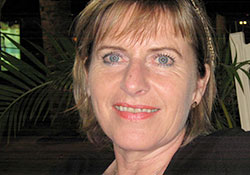Katrin Osk Porgeirsdottir works at a forensic psychiatric unit in Iceland

Katrin Osk Porgeirsdottir works in the only forensic psychiatry unit in Iceland, at the Health Institute of Southern Iceland. She is 50 years old and has three sons: her husband is a carpenter and makes church organs. She lives in a small village; Iceland has one of the smallest populations in Europe.
"Our patients come to us through the department of justice. They have committed serious crimes. This is usually as a result of illness: some patients suffer from schizophrenia, but drug abuse is very often the trigger. More and more young people are using hard drugs, and many of them have small children; between twenty to thirty children lose their mother through drug abuse every year. Many of our patients do not want to accept that they are ill. We treat patients mostly by medicine injections, and at the beginning they are not happy to be treated as they have to be weaned from their drug habit.
I work with the patients at every stage and help them to help themselves: they don’t always appreciate the opportunities that we can offer them. They get mad at us, because they have not been sent to jail. This is because if they go to jail, they can leave when they have served the sentence, but being a patient in a forensic psychiatry unit means that they have to stay or be followed up, until they are better, which could be some years.
We try very hard to keep our unit drug free and we have made much progress. I find my work in the forensic psychiatry unit very interesting, but challenging at the same time. For me, one of my greatest joys is to see a patient leave our unit and go out into the community, happy with himself. I then feel enormously satisfied with my work, knowing that the person is coping with life again.
A health system should be for all, as all are equal. It should change as the community changes, and different needs emerge and it should focus on prevention. The Icelandic health system is one of the best systems in the world although it is very expensive for the Icelandic State. I think that it is very important to find solutions for children with psychiatric problems. Parents are not well prepared to raise children - being a parent is not always something instinctive. I think we could do better in teaching parents how to bring up their children and this is starting in some towns where parents pay less in the kindergarten if they participate in an education programme.
I think we are on the right path but we do not have enough solutions for all these people who have been out of society for a long period of time, and maybe the only "friends" they have are people like them from the group. We need more places where qualified staff can attend to these people and where they can be secure; we need a social worker, and more psychologists, and purpose-built premises would help! Public recognition of these kinds of illnesses would make a difference too. But we are on the right path."



